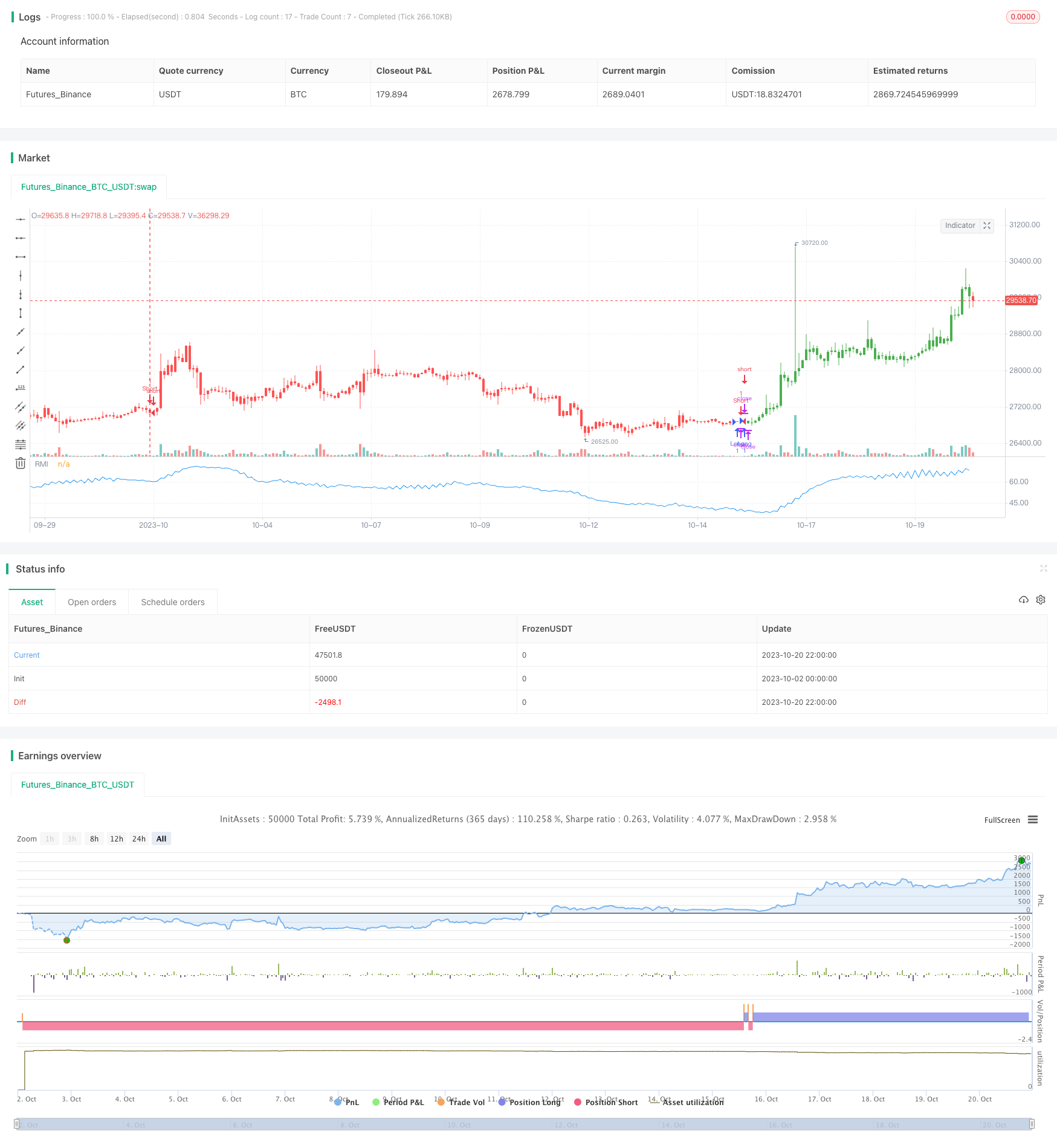
概述
动量反转指数(Relative Momentum Index,RMI)策略是基于动量指数的改良策略。该策略通过计算一段时间内价格变化的动量,判断市场是否处于超买或超卖状态,以捕捉反转机会。
策略原理
RMI策略的计算公式如下:
xMom = xPrice - xPrice[Length] //计算Length周期内的价格变动
xMU = 如果xMom >= 0:之前xMU减去xMU/Length加上xMom;否则:之前xMU
xMD = 如果xMom <= 0:之前xMD减去xMD/Length加上xMom的绝对值;否则:0
RM = xMU / xMD
RMI = 100 * (RM / (1 + RM))
该策略首先计算Length周期内的价格变动xMom。如果xMom>=0,表示价格上涨,则xMU累加xMom;如果xMom,表示价格下跌,则xMD累加xMom的绝对值。RM是xMU和xMD的比值,代表涨跌力度。RMI对RM做归一化处理,得到0-100之间的指数。
当RMI高于阈值SellZone时,表示超买,做空;当RMI低于阈值BuyZone时,表示超卖,做多。
策略优势
- RMI指数相比RSI指数,更加灵敏,能更早捕捉价格反转机会。
- RMI对涨跌力度进行度量,不会受到震荡行情的影响。
- RMI以动量为基础,能更准确判断超买超卖状态。
策略风险
- 和其他反转策略一样,RMI策略存在被套利的风险。强势行情下买点会被突破。
- RMI参数需要针对不同品种进行优化,否则效果可能不佳。
- 需要合理设置超买超卖阈值,否则会产生过多虚假信号。
可通过适当放宽止损点位、优化参数组合、与趋势策略组合等方式降低风险。
策略优化
RMI策略可从以下几个方面进行优化:
- 优化Length参数,选择能最大化策略收益的周期长度。
- 优化超买超卖阈值,降低虚假信号概率。
- 增加止损机制,控制单笔损失。
- 与趋势跟踪或均线策略组合,提高胜率。
- 根据不同品种特点选择合适的交易时段,提高策略稳定性。
总结
RMI策略通过测量价格动量变化,进行反转操作,可有效捕捉短线回调机会。相比RSI策略,RMI策略更灵敏,不受震荡影响。但该策略仍存在被套期风险,需优化参数并配合趋势策略使用,才能发挥最大效果。
策略源码
/*backtest
start: 2023-10-02 00:00:00
end: 2023-10-21 00:00:00
period: 2h
basePeriod: 15m
exchanges: [{"eid":"Futures_Binance","currency":"BTC_USDT"}]
*/
//@version=2
////////////////////////////////////////////////////////////
// Copyright by HPotter v1.0 19/10/2017
// The Relative Momentum Index (RMI) was developed by Roger Altman. Impressed
// with the Relative Strength Index's sensitivity to the number of look-back
// periods, yet frustrated with it's inconsistent oscillation between defined
// overbought and oversold levels, Mr. Altman added a momentum component to the RSI.
// As mentioned, the RMI is a variation of the RSI indicator. Instead of counting
// up and down days from close to close as the RSI does, the RMI counts up and down
// days from the close relative to the close x-days ago where x is not necessarily
// 1 as required by the RSI). So as the name of the indicator reflects, "momentum" is
// substituted for "strength".
//
// You can change long to short in the Input Settings
// WARNING:
// - For purpose educate only
// - This script to change bars colors.
////////////////////////////////////////////////////////////
strategy(title="Relative Momentum Index", shorttitle="RMI")
xPrice = close
Length = input(20, minval=1)
BuyZone = input(40, minval=1)
SellZone = input(70, minval=1)
reverse = input(false, title="Trade reverse")
// hline(0, color=gray, linestyle=dashed)
// hline(SellZone, color=red, linestyle=line)
// hline(BuyZone, color=green, linestyle=line)
xMom = xPrice - xPrice[Length]
xMU = iff(xMom >= 0, nz(xMU[1], 1) - (nz(xMU[1],1) / Length) + xMom, nz(xMU[1], 1))
xMD = iff(xMom <= 0, nz(xMD[1], 1) - (nz(xMD[1],1) / Length) + abs(xMom), nz(xMD[1], 0))
RM = xMU / xMD
nRes = 100 * (RM / (1+RM))
pos = iff(nRes < BuyZone, 1,
iff(nRes > SellZone, -1, nz(pos[1], 0)))
possig = iff(reverse and pos == 1, -1,
iff(reverse and pos == -1, 1, pos))
if (possig == 1)
strategy.entry("Long", strategy.long)
if (possig == -1)
strategy.entry("Short", strategy.short)
barcolor(possig == -1 ? red: possig == 1 ? green : blue )
plot(nRes, color=blue, title="RMI")